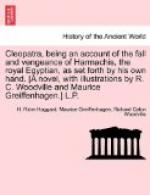“Thereon, the war being ended, though she had but then borne him a son, Caesarion, Caesar appointed the younger Ptolemy to rule with Cleopatra, and be her husband in name, and he himself departed for Rome, bearing with him the beautiful Princess Arsinoe to follow his triumph in her chains. But the great Caesar is no more. He died as he had lived, in blood, and right royally. And but now Cleopatra, the Queen, if my tidings may be trusted, has slain Ptolemy, her brother and husband, by poison, and taken the child Caesarion to be her fellow on the throne, which she holds by the help of the Roman legions, and, as they say, of young Sextus Pompeius, who has succeeded Caesar in her love. But, Harmachis, the whole land boils and seethes against her. In every city the children of Khem talk of the deliverer who is to come—and thou art he, Harmachis. The time is almost ripe. The hour is nigh at hand. Go thou back to Abouthis and learn the last secrets of the Gods, and meet those who shall direct the bursting of the storm. Then act, Harmachis—act, I say, and strike home for Khem, rid the land of the Roman and the Greek, and take thy place upon the throne of thy divine fathers and be a King of men. For to this end thou wast born, O Prince!”
CHAPTER V
OF THE RETURN OF HARMACHIS TO ABOUTHIS; OF THE CELEBRATION OF THE MYSTERIES; OF THE CHANT OF ISIS; AND OF THE WARNING OF AMENEMHAT
On the next day I embraced my uncle Sepa, and with an eager heart departed from Annu back to Abouthis. To be short, I came thither in safety, having been absent five years and a month, being now no more a boy but a man full grown and having my mind well stocked with the knowledge of men and the ancient wisdom of Egypt. So once again I saw the old lands, and the known faces, though of these some few were wanting, having been gathered to Osiris. Now, as, riding across the fields, I came nigh to the enclosure of the Temple, the priests and people issued forth to bid me welcome, and with them the old wife, Atoua, who, but for a few added wrinkles that Time had cut upon her forehead, was just as she had been when she threw the sandal after me five long years before.
“La! la! la!” she cried; “and there thou art, my bonny lad; more bonny even than thou wert! La! what a man! what shoulders! and what a face and form! Ah, it does an old woman credit to have dandled thee! But thou art over-pale; those priests down there at Annu have starved thee, surely? Starve not thyself: the Gods love not a skeleton. ’Empty stomach makes empty head’ as they say at Alexandria. But this is a glad hour; ay, a joyous hour. Come in—come in!” and as I lighted down she embraced me.
But I thrust her aside. “My father! where is my father?” I cried; “I see him not!”
“Nay, nay, have no fear,” she answered; “his Holiness is well; he waits thee in his chamber. There, pass on. O happy day! O happy Abouthis!”




